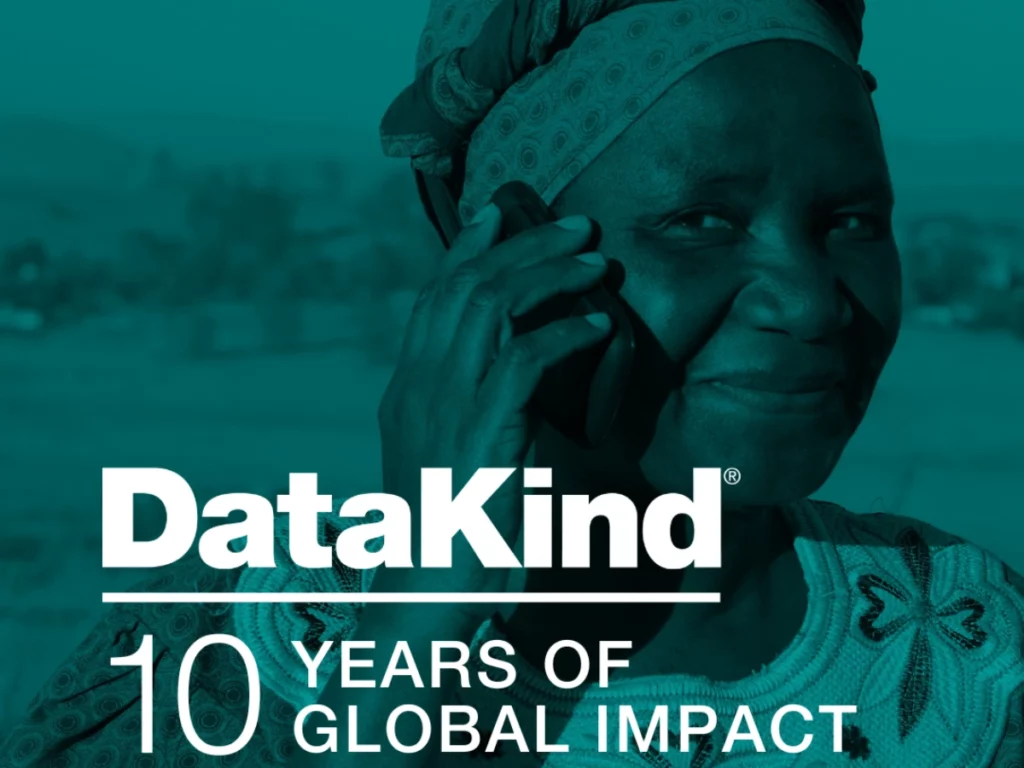This year, we’re celebrating 10 years of successfully leveraging Data for Good—an idea that seemed novel a decade ago when data science was barely on the radar.
Since our founding in 2012, we’ve worked alongside the social sector community, leading as a technical partner and driving social change with the power of data science and AI. We’ve mobilized an international community of 20,000+ skilled technologists, we’ve collaborated with Chapters in Bengaluru, Singapore, San Francisco, United Kingdom, and Washington DC, and we’ve completed 350+ projects and delivered more than $35 million in pro bono services. DataKind’s size and fluidity, in combination with our massive reach, scope, and ability to handle highly complex issues, has uniquely positioned us to connect people and systems to maximize impact.
.gif)
We’ve helped organizations not just understand if data science works, but how it can be used in the service of humanity. From expediting medical treatment to those in need, increasing access to water and sanitation to advancing COVID-19 response, ensuring more college students graduate, and so much more. Our work has had an impact throughout numerous locales, from Michigan to Florida, from Haiti to Uganda, and across the globe.
Now, as we reflect on a decade of global impact, we’re focused on growing that impact for the next 10 years and beyond. Join us as we highlight ten projects and our amazing partners in honor of our 10 year anniversary. These ten projects are examples of what we can do when we harness the power of data science and AI with the social sector.

Optimizing access to healthcare. We helped community health workers transport patients and medical samples quicker (60 days to under a day) by digitizing and automating written records. (Riders for Health)
![]()
Advancing racial wealth equity. We helped transform data into actionable insights by developing a first of its kind Racial Wealth Equity Database, drawing from dozens of different data sources and producing more than 30 visualizations. (Black Wealth Data Center)

Mitigating home fire deaths. We helped to identify neighborhoods at risk of fires to target for in-home safety education and smoke alarm installations by building the Home Fire Risk Map tool, conducting nearly 900,000 home fire safety visits, installing more than 2.1 million smoke alarms in communities that need them most, and saving 800+ lives. (DataKind DC, American Red Cross)

Enabling conservationists to quickly mine research. We helped make the process of synthesis faster, more efficient, and more affordable by building the Colandr tool that automatically summarizes academic papers and presents the state of knowledge through systematic maps. It’s already been adopted by 200+ organizations. (Science for Nature and People Partnership, Conservation International)

Increasing access to water. We saved a water district in California an estimated $25 million in avoided capital storage costs by predicting customer demand more accurately. (Moulton Niguel Water District)

Improving college success. We identified students at risk of not graduating by enabling a college to intervene sooner, increasing the graduation rate to 73% (from a projected 54%) in year one. (John Jay College)

Advancing housing loss decision making. We helped local leaders understand where housing loss is most acute, when during the year housing loss is occurring, and who is most impacted by building the open source Foreclosure and Eviction Analysis Tool (FEAT). (New America’s Future of Land and Housing Program)

Increasing access to sanitation. We increased community access to mobile sanitation services in Haiti amidst the pandemic by improving transportation efficiency by 10% and reducing costs and fuel use. (SOIL Haiti)

Understanding equity in local governments. We helped the City of San José better understand the quality of government services by launching an open data standard and framework to direct resources to the community in the most equitable way. Part of that partnership was an impetus towards the City of San Jose getting a million dollar grant from the Knight Foundation. (DataKind San Francisco, City of San José Mayor’s Office of Technology & Innovation)

Building confidence in community health systems. We addressed bottlenecks in the delivery of community health services by developing an open-soured, community-informed data quality and integrity monitoring toolkit called the Data Observation Toolkit, now recognized as a Digital Public Good. (Living Goods, Medic, BRAC)
Join the DataKind movement.
- Interested in supporting our work? Donate here.
- Interested in sponsoring a project? Partner with us.
- Interested in volunteering with DataKind? Look no further.
- Interested in working at DataKind? We’re hiring!
- Interested in submitting a project? Go for it!
Quick Links
- Improving College Student Success: DataKind’s Continued Work in Post-Secondary Education
- Advancing Economic Empowerment in Communities Across the U.S.: DataKind Launches Seven New Projects
- The Global Food Crisis: DataKind Sets Focus for Our 10 Year Anniversary + Beyond
- Empowering Health Worker and Community Health Systems: Data Integrity and the Future of Intelligent Community Health Systems in Uganda



